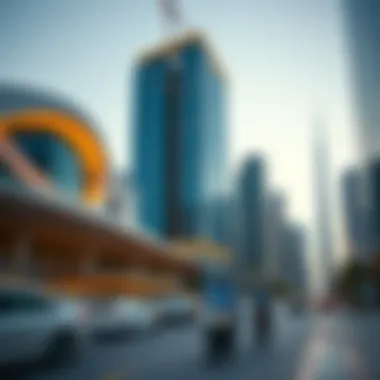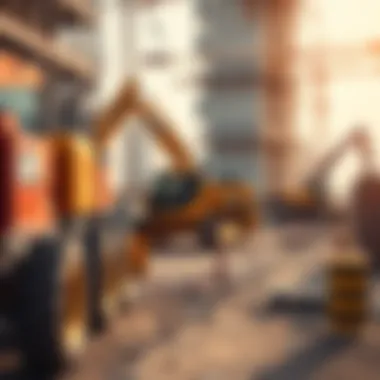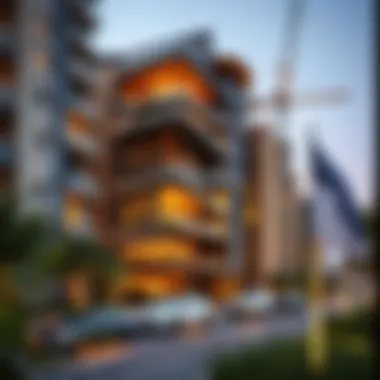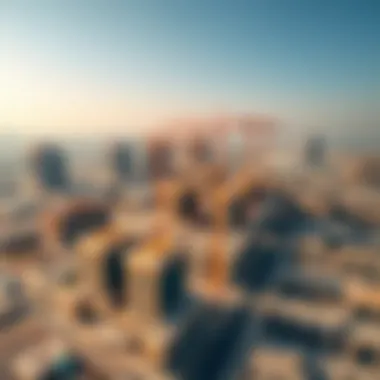Dubai Construction News: Trends and Future Insights


Intro
The construction industry in Dubai has long been a focal point of innovation and investment, capturing the attention of real estate enthusiasts and investors alike. The rapid development in this desert metropolis reflects not just ambition, but also a blend of modern technology and cultural vibrance that can't be found anywhere else. In the scope of this piece, we'll take a closer look at the current state of the market, emerging trends, and the challenges that stakeholders face.
As new skyscrapers arise from the skyline and infrastructure projects reshape urban landscapes, understanding these dynamics is crucial for anyone invested in this sphere. From technology adoption to sustainable practices, the construction scene in Dubai is nothing short of dynamic. However, it is not without hurdles, ranging from regulatory shifts to resource sustainability.
This article seeks to provide a comprehensive overview that caters to investors, homeowners, real estate agents, tenants, and developers aiming to navigate this evolving field with clarity and purpose.
Market Insights
Current Property Trends
Today's Dubai real estate market is a tapestry woven with diverse opportunities. Properties range from luxury villas in Palm Jumeirah to more affordable apartments in the city center. According to recent reports, demand for residential spaces has been climbing, fueled by an influx of expatriates and continued interest from international investors.
The market is witnessing a shift towards mixed-use developments, which combine residential, retail, and recreational spaces. This trend not only enhances property value but also enriches community living. Here are some notable points about the current property trends:
- Sustainability Focus: More projects are adhering to green building standards, which aligns with Dubai's vision for a sustainable future.
- Smart Homes: Technology integration in home design enhances convenience and energy efficiency, resonating well with the modern consumer.
- Flexible Workspaces: As remote work becomes more commonplace, demand for adaptable office spaces is steadily increasing.
Investment Opportunities
For investors eyeing the Dubai construction market, opportunities abound. Various sectors are showing promise, including:
- Luxury Real Estate: High-net-worth individuals continue to seek opulent residences, driven by the glamorous lifestyle Dubai offers.
- Tourism-Related Developments: With Dubai being a global tourism hub, hospitality and entertainment sectors are gaining traction rapidly.
- Infrastructure Projects: Megaprojects such as the Dubai Creek Tower and Expo 2020 venues offer substantial returns on investment due to their anticipated impact on the economy.
Investors are recommended to keep an eye on regulatory changes, as these can significantly influence market dynamics. Understand the legal landscape before committing funds.
Practical Tips
Guide to Buying Property
For individuals looking to buy property in Dubai, it's essential to do thorough due diligence. Start by familiarizing yourself with the different freehold and leasehold areas, each with its own set of regulations. Here are some helpful steps:
- Research the Location: Consider proximity to amenities like schools, hospitals, and public transport.
- Understand the Fees: Beyond the purchase price, account for registration fees, service charges, and mortgage costs, if applicable.
- Engage a Real Estate Agent: Local agents can provide insider knowledge, assisting you in navigating the complexities of the market.
Renting vs. Buying: What You Need to Know
The age-old question of renting versus buying is particularly relevant in Dubai. When contemplating which path to take, consider the following:
- Duration of Stay: If planning to stay long-term, buying may be more financially sound.
- Market Conditions: In a fluctuating market, renting might offer more flexibility without the commitment.
- Financial Position: Evaluate if your current income and savings align with the responsibilities of homeownership.
Additional resources:
By actively engaging with these insights, stakeholders can navigate the complexities of Dubai’s construction sector with confidence.
The State of Dubai’s Construction Industry
Dubai's construction industry is not just a barometer of the city's economy; it reflects the ambitious spirit of development that characterizes this vibrant metropolis. As a hub of trade, tourism, and innovation, the construction sector stands at the forefront of Dubai's growth trajectory. Understanding the current state of this industry offers crucial insights for investors, homeowners, developers, and all stakeholders involved.
With a track record of world-class projects and investments pouring in from various corners of the globe, Dubai's construction market is a testament to how urban aspirations meet engineering prowess. The city has firmly positioned itself as a pioneer in construction practices, showcasing breathtaking skylines and avant-garde infrastructures. By delving into this section, readers can appreciate how economic factors, government regulations, and technological innovations converge to shape the landscape of construction.
Current Market Overview
As of late 2023, Dubai's construction sector is on a robust path to recovery and growth post-COVID-19. The market has rebounded with renewed energy, driven by a surge in demand across both residential and commercial segments. Key indicators suggest that the overall value of construction contracts awarded has significantly increased compared to previous years, reflecting a bright outlook for the industry.
Another element influencing the market is the anticipated influx of major events — such as the ongoing legacy projects from Expo 2020 — which has led to an uptick in competitive bidding, construction contracts, and partnerships among local and international firms.
Moreover, the Dubai government has streamlined procurement processes, making it easier for companies to engage in projects, which in turn fosters a favorable environment for future investments. Market trends indicate that traditional construction methods are being replaced increasingly by innovative approaches, ensuring efficiency and sustainability.
Key Players in the Market
The construction industry in Dubai is crowded with dynamic companies each contributing to its narrative. Some of the most notable names include


- Emaar Properties: Renowned for its iconic developments like the Burj Khalifa and Dubai Mall, Emaar plays a pivotal role in luxury residential and commercial projects.
- Arabtec Construction: A major player in delivering large-scale projects, Arabtec's portfolio includes significant developments such as the Louvre Abu Dhabi.
- DAMAC Properties: Focused on luxury real estate, DAMAC has carved a niche in high-end residential spaces, catering to affluent clients from across the globe.
These companies, along with various international firms, create a competitive landscape where innovation and quality merge. Their combined expertise and capabilities set benchmarks for quality assurance, project management, and client satisfaction.
Major Construction Projects Underway
Dubai is bustling with numerous construction projects that underline its ambitions to remain a global leader in architecture and sustainability. Some notable projects currently underway include:
- Dubai Creek Tower: Set to eclipse the heights of the Burj Khalifa, this tower aims to redefine the skyline while incorporating advanced engineering technologies.
- Dubai Harbour: A new maritime venture promising luxury living and entertainment, it will feature hotels, residences, and a state-of-the-art cruise terminal.
- Bahrain Bay Development: Although located in Bahrain, this project has implications for Dubai's real estate sector, providing opportunities for investment and collaboration in the region.
These projects are expected to attract considerable investments, enhance the city's tourism appeal, and contribute to economic diversification.
By understanding the intricate web of factors influencing Dubai's construction industry, stakeholders can better navigate its challenges and seize opportunities that arise.
Technological Innovations in Construction
In the landscape of Dubai's construction sector, technological innovations stand as a cornerstone of modern development. The rapid pace of urbanization and the demand for high-quality infrastructure have pushed stakeholders to explore new tools and methodologies. Not only do these innovations enhance efficiency, but they also drive down costs and improve the overall quality of construction projects. Investors and developers must keep a keen eye on these advancements, which are reshaping the very foundation of how buildings and infrastructures are conceived, designed, and constructed.
Adoption of Smart Construction Techniques
Smart construction techniques are gaining traction in Dubai, playing a pivotal role in streamlining processes. These involve the integration of Internet of Things (IoT) devices, drones, and advanced software to create a fluid and intelligent construction environment. Utilizing sensors on construction sites allows for real-time monitoring of progress and resource utilization, reducing waste and inefficiencies.
Some key benefits of smart construction include:
- Enhanced safety: IoT devices can detect potential hazards and alert workers accordingly.
- Improved resource management: Data-driven insights aid in optimizing the distribution of materials and crew management.
- Increased transparency: Stakeholders can track project progress through real-time updates, ensuring everyone remains informed and aligned with the project's goals.
As more companies recognize the significance of these technologies, the construction scene in Dubai could see a dramatic transformation towards increased safety and efficiency.
Impact of Artificial Intelligence and Automation
Artificial intelligence (AI) and automation are poised to revolutionize Dubai's construction industry. By automating repetitive tasks, AI allows skilled workers to focus on more complex and value-add activities. For instance, using AI-driven algorithms to schedule shifts can lead to greater productivity and workforce satisfaction.
The advantages of implementing AI and automation are manifold:
- Predictive Analytics: Anticipating project risks and delays through data analysis ensures proactive management.
- Design Optimization: AI can analyze various design options quickly, suggesting the most efficient solutions tailored to client needs.
- Cost savings: Automating certain tasks can significantly reduce labor costs while improving speed and consistency.
Organizations must be prepared to invest in technological infrastructure to fully leverage AI's potential, positioning themselves ahead of the curve amid evolving industry dynamics.
Use of Prefabrication and Modular Construction
Prefabrication and modular construction have emerged as not just trends, but a necessity in Dubai's bustling construction market. These methods involve manufacturing components off-site and assembling them on-site, resulting in substantial time savings and minimized disruption.
Some advantages of this approach include:
- Reduced construction time: Building modules in parallel with site preparation allows projects to move ahead faster than traditional methods.
- Consistent quality: Factory-controlled conditions ensure materials are built to precise specifications, which can enhance longevity and quality.
- Sustainability benefits: Prefabrication reduces waste since materials are used more efficiently, aligning with the region's increasing focus on sustainability.
The shift towards prefabrication reflects a broader transformation in construction practices, responding to the urgent need for swift, high-quality builds while adhering to sustainability goals.
"The incredible growth in Dubai’s skyline is truly a story defined by innovation, where every new project tells a chapter of our technological evolution."
To conclude, embracing technological innovations is not just an option but a necessity for the continued growth of Dubai’s construction sector. Stakeholders who adapt and integrate these advancements can expect rewards in efficiency, quality, and sustainability.
Sustainability Trends in Construction
Sustainability has become more than just a buzzword in the construction sector in Dubai; it’s a crucial aspect shaping future developments. Given the rapid urbanization and construction growth, the region grapples with the challenge of ensuring that its expansion does not come at the expense of environmental integrity. Embracing sustainable practices is essential, not only for the conservation of resources but also for attracting investors and residents who prioritize eco-friendly living spaces.
The integration of sustainable trends goes beyond compliance with regulations; it encompasses innovative practices that reduce waste, enhance energy efficiency, and even foster community well-being. As environmental concerns become paramount, construction stakeholders are compelled to re-evaluate their approaches and invest in sustainability. According to the UAE’s vision and strategic plans, the aim is to create a resilient, future-ready construction landscape that contributes positively to both people and the planet.
Regulatory Framework for Sustainable Building
Dubai's government has rolled out a robust regulatory framework aimed at steering the construction sector toward greener practices. This framework consists of numerous policies, laws, and guidelines promoting sustainability. The Dubai Municipality, in particular, has introduced the Green Building Regulations which align with global sustainability standards. These regulations not only outline the technical specifications for new buildings but also push for sustainable practices across various phases of construction.
One significant regulation includes the requirement for buildings to achieve a certain rating in the Green Building Index. This measure acts as a guideline for developers, ensuring that they incorporate energy-efficient systems, water-saving features, and sustainable materials in their projects. The framework reflects Dubai’s commitment to reducing its carbon footprint while ensuring long-term economic viability.


Green Building Certifications
Green building certifications are vital for demonstrating a commitment to sustainability. In Dubai, certifications like LEED (Leadership in Energy and Environmental Design) and Estidama pearl rating system are increasingly sought after by developers. These certifications validate the performance of buildings in terms of environmental conservation, resource management, and occupant health.
Investors looking to secure a foothold in the market often consider such certifications as a mark of quality. Properties that boast green certifications tend to have higher resale values and appeal to a demographic increasingly conscious of environmental impact. Moreover, banks offer favorable financing terms for certified projects, enhancing their attractiveness to developers.
Energy Efficiency Practices
Energy efficiency represents a cornerstone of sustainability in construction, especially in a region like Dubai, known for its extreme climate. Innovative practices in energy management not only cut costs but also contribute to a reduced environmental footprint. Techniques such as installing solar panels, utilizing energy-efficient HVAC systems, and incorporating smart building technologies have gained traction.
The use of building management systems allows for real-time monitoring of energy consumption. This is often reflected in improved operational efficiency and lowered utility costs. Traditional methods are being replaced by modern approaches that not only ensure compliance with regulations but also meet the expectations of a growing eco-conscious population.
"Incorporating energy efficiency into construction is not merely a trend; it’s a necessity that can no longer be ignored."
This underscores the shift towards a more sustainable future, positioning Dubai as a leader in environmentally responsible construction, while balancing the demands of rapid urbanization with the urgent need for ecological preservation. Ultimately, sustainability trends in construction are paving the way for a resilient and responsible urban landscape.
Challenges Facing the Construction Sector
The construction sector in Dubai is not without its hurdles. While the skyline is dotted with towering skyscrapers and ambitious infrastructure projects, it faces a unique set of challenges that can significantly impact its growth trajectory. Recognizing these obstacles is essential for stakeholders, including investors, homeowners, and developers, to navigate the evolving landscape effectively. This overview will dissect these challenges into three critical aspects: labor shortages and skills gaps, economic fluctuations and their influence, and the regulatory and bureaucratic hurdles affecting project timelines and costs.
Labour Shortages and Skills Gap
One of the most pressing challenges in Dubai's construction industry is the issue of labor shortages combined with a widening skills gap. The construction boom has led to an increased demand for skilled labor, yet the supply simply isn't keeping pace. Many workers lack the required specialized training essential for operating advanced machinery or implementing innovative construction methods. This situation not only slows down project timelines but also affects the overall quality of work.
It's crucial for companies to focus on training and development programs, fostering the next generation of construction professionals. Collaborations with vocational schools and universities could bridge this gap effectively. Beyond just filling positions, this effort helps ensure that the workforce is well-equipped to tackle the specific challenges of modern construction, such as sustainability and advanced technologies.
Economic Fluctuations and Their Impact
Economic fluctuations have always been a double-edged sword for the construction industry. On one hand, periods of economic growth spur investment and job creation, leading to increased construction activities. On the other hand, downturns can halt projects, freeze funding, and lead to layoffs. The pandemic highlighted the vulnerability of the sector; many projects were postponed, and financing dried up. A rollercoaster economy can deter investors who seek stable returns.
As per recent reports, consistent monitoring of economic indicators can help stakeholders anticipate downturns, allowing them to make informed decisions about when to invest or pull back.
The focus should shift towards creating resilient business models that can withstand these fluctuations, perhaps by diversifying into various types of projects—commercial, residential, and infrastructure. This adaptability not only ensures continuity but can also capitalize on opportunities created by changing market conditions.
Regulatory and Bureaucratic Hurdles
Navigating the regulatory environment can feel like walking through a labyrinth for many stakeholders in the construction sector. From obtaining permits to adhering to safety regulations and environmental standards, the maze of regulations can delay projects and inflate costs. Each step, from approval to launch, involves countless interactions with multiple regulatory bodies, contributing to inefficiencies.
To mitigate these hurdles, there's a growing call for streamlined processes and clearer guidelines. The implementation of digital platforms to simplify regulatory compliance might offer some relief, providing a one-stop shop for necessary documentation and approvals. Simpler regulations and quicker responses can significantly enhance project flow and help investors feel more secure in their ventures.
Addressing these challenges is not merely an option but a necessity if Dubai's construction industry is to maintain its reputation as a global leader. By investing in talent development, fostering economic resilience, and simplifying regulatory processes, stakeholders can build a brighter, more sustainable future for construction in the Emirate.
Future Outlook for Dubai’s Construction Industry
The future outlook for Dubai's construction industry is a focal point for understanding not only the local economic landscape but also the broader impacts on urban development. Investors, homeowners, real estate agents, and developers alike must keep an eye on this segment, as it shapes the evolution of one of the world's most iconic cities. With a mixture of ambition and pragmatism, the industry is expected to undergo significant transformations fueled by market trends, investment opportunities, and long-term urban development plans. A forward-looking perspective provides essential insights into navigating challenges and capitalizing on growth prospects.
Predicted Market Trends
Several intriguing trends are anticipated to take centre stage in Dubai's construction market over the coming years. First, a noteworthy shift towards automation is likely. This doesn’t only refer to the use of robots, but also to software and data analytics that streamline project management. Take for instance the growing popularity of Building Information Modeling (BIM), which allows for comprehensive planning and resource management. Builders can significantly reduce time and costs by identifying potential issues before breaking ground.
Moreover, urbanization remains a key driving force. Population growth in Dubai will likely continue to spur demand for diverse housing solutions—from affordable units for families to luxurious high-rises. As real estate developers tackle this demand, mixed-use developments that combine residential and retail spaces will likely feature prominently.
Another trend is sustainability. With regulations tightening, the emphasis on eco-friendly practices will not wane. Developers are expected to incorporate recycled materials and energy-efficient technologies more than ever.
Investment Opportunities and Risks
The Dubai construction landscape presents a dual-edged sword of opportunity and risk for investors. For one, the potential for high returns is tangible, particularly in niche markets such as smart buildings and green infrastructure. As Dubai positions itself as a technological hub, investors can find lucrative prospects in smart home technologies and energy-efficient designs.
However, navigating this terrain is not without its pitfalls. Economic fluctuations can pose a significant risk. The volatility stemming from global market dynamics could ripple through property demand and investment portfolios. As such, investors must maintain a diversified portfolio to hedge against downturns.
Moreover, regulatory challenges can surprise even seasoned players. Investors should stay updated with local laws and compliance expectations, as changes can happen quite rapidly. The need for a thorough risk assessment before plunging into venture becomes increasingly crucial.
Long-term Urban Development Plans


Dubai's long-term urban development strategies reveal much about the future of the construction industry. Government initiatives, like the Dubai Urban Master Plan, aim to create sustainable and connected urban areas by 2040. This master plan highlights projects aimed at enhancing transportation networks and integrating innovative green spaces, which all require substantial construction activity.
Additionally, significant investment into public transport infrastructure, such as the metro and tram systems, is in play. These projects not only improve accessibility but also act as catalysts for surrounding real estate developments. For instance, areas close to transit stations tend to increase in value, making them appealing spots for future developments.
The overarching narrative points to a dynamic trajectory for Dubai's construction industry—a multifaceted arena ripe with potential. As this vibrant city continues to evolve, stakeholders must stay engaged and informed to make the most of the unfolding opportunities and navigate the inherent challenges effectively.
Impact of Major Events on Construction
The construction industry in Dubai has long been shaped by significant events that influence everything from investment to project completion. Major happenings such as Exposition events or global crises have a ripple effect, steering the direction and pace of construction activities. Understanding the impact of these events provides valuable insights for investors, developers, and stakeholders aiming to navigate this dynamic sector.
Expo and Legacy Projects
Expo 2020 was originally slated to be a grand event showcasing innovation and culture from around the globe, held in Dubai. Although delayed due to the pandemic, it served as a catalyst for unprecedented construction advancements, both in terms of scale and sustainability. The infrastructure built for the Expo encompassed advanced architectural designs and cutting-edge technologies, setting a new benchmark for future developments.
- Key Developments: Significant venues like the UAE Pavilion and Al Wasl Plaza are more than just event spaces; they are designed for long-term utility post-Expo. These structures reflect Dubai’s commitment to sustainability through energy-efficient systems and sustainable materials.
- Economic Boost: The construction activities tied to the Expo injected substantial capital back into Dubai’s economy. Real estate agents noted a spike in inquiries for properties in proximity to the Expo site, which underscored a burgeoning interest from both local and international investors.
"The legacy of Expo 2020 will continue to enhance Dubai's reputation in global markets, making it an enduring hub for tourism and business," said a local real estate expert.
COVID-19's Effect on the Construction Sector
The recent global pandemic disrupted sectors worldwide, and construction was no exception. In Dubai, construction projects faced delays and increased costs due to supply chain issues and labor shortages. However, the sector displayed resilience, adapting to the rapidly changing environment.
- Postponed Projects: Many projects were put on hold as stakeholders assessed safety protocols and compliance with health regulations. This led to a backlog of work that is gradually being addressed as conditions stabilize.
- New Practices: Companies began integrating health guidelines into construction protocols. The rise of remote management tools was evident, facilitating the ongoing operation of sites even with social distancing measures in place.
- Future Readiness: As the sector begins to rebound, there’s a learning curve that emphasizes flexibility and innovative thinking. The pandemic has not merely presented challenges; it has prompted construction firms to re-evaluate their project management strategies and invest in more resilient supply chains.
The lessons learned through COVID-19 may enhance the sector's ability to cope with future disruptions. Consequently, the ability to adapt quickly is paramount, ensuring sustained growth and investor confidence within the region.
Insights from Industry Experts
The insights from industry experts provide a window into the dynamic landscape of Dubai's construction sector. Their perspectives are invaluable for a myriad of stakeholders, from seasoned investors to budding developers. When it comes to navigating the ebb and flow of this constantly shifting market, understanding the thoughts of those deeply embedded in the industry can make all the difference.
Perspectives on Future Developments
Experts highlighting future developments emphasize the shift towards sustainability and efficiency. As the UAE commits to a more sustainable future, it's changing how projects are conceptualized and executed. For instance, many specialists point out that upcoming construction projects are more likely to integrate green building techniques, which could serve both environmental and financial goals. They caution that, while this trend is promising, it presents challenges such as the need for new materials and construction methods that many local firms might not yet be adept in.
"The key to success in construction is not just about meeting demand but anticipating the shifts before they happen," one veteran developer notes, underlining the significance of market adaptability.
Moreover, the role of tech advancements, particularly in automation and artificial intelligence, is often discussed. Many analysts predict an uptick in digitalized construction management tools that enhance efficiency by automating mundane tasks. This could potentially lead to lower labor costs and faster project completion times.
Advice for New Investors
When delving into investments, industry insiders stress the importance of thorough due diligence. For new investors, understanding the nuances of the market, like regulatory requirements and local market behaviors, cannot be overstated. Here are some pointers gathered from discussions with experts:
- Understand Local Regulations: Knowing city planning regulations and how they can impact your investment should be a top priority.
- Network and Collaborate: Building relationships with established players in the industry can provide invaluable insights and open doors for potential partnerships.
- Focus on Sustainability: With global trends leaning towards green initiatives, investments that prioritize sustainable building practices may offer better long-term viability.
- Stay Ahead of Tech Trends: Embracing technology early can provide a competitive edge in project management and execution.
- Consider Long-Term Urban Plans: Investors should familiarize themselves with the city’s strategic plans, as they could indicate areas of growth and opportunity in the real estate market.
With these insights, investors can make informed choices that align with both current market conditions and future trends. Staying engaged with ongoing developments in the sector can also provide the foresight needed for successful investments.
Case Studies of Notable Projects
Examining case studies of notable projects in Dubai's construction sector provides valuable insights into the intricacies and monumental efforts that shape this flourishing industry. These case studies showcase not just architectural prowess, but also the innovative approaches taken to overcome challenges, utilize technology, and integrate sustainability within their frameworks. Moreover, they reveal the patterns and lessons learned, which investors, homeowners, and developers can leverage for future ventures.
High-Rise Developments
The high-rise developments in Dubai are iconic representations of modern architectural feats. One stellar example is the Burj Khalifa, the tallest building in the world, which offers a glimpse into the ambitious vision of Dubai's skyline. This skyscraper rises to a staggering 828 meters and symbolizes the integration of cutting-edge engineering and aesthetics. Developers faced challenges such as extreme weather conditions and logistical hurdles during the construction phase.
Considerations for investors often revolve around the potential return on investment (ROI) due to increased commercial and residential interest. With its observation decks and luxurious amenities, the Burj Khalifa attracts millions of visitors annually, solidifying its status as a financial boon for surrounding properties and businesses. High-rise developments here are not just about height but about creating a vertical community, which is particularly important in the densely populated areas of Dubai.
Residential Complexes
In recent years, Dubai has seen a surge in residential complexes designed to cater to various demographics. Dubai Hills Estate, for instance, combines luxury with accessibility. The project features a collection of villas, apartments, and townhouses alongside expansive green spaces. This development is aligned with the city’s vision of creating livable spaces that also prioritize sustainability.
Key benefits of such residential complexes include increased property value in sought-after areas and an enhanced lifestyle for residents, thanks to proximity to parks, schools, and retail spaces. Furthermore, these structures often integrate smart home technologies, appealing to tech-savvy buyers looking for conveniences in their everyday lives.
Infrastructure Initiatives
Infrastructure initiatives play a fundamental role in enabling Dubai to support its rapid growth. A noteworthy project includes the renovation of the Dubai Metro System, which has expanded its reach to cover more neighborhoods and link business hubs efficiently. This project not only improves transportation but also reduces traffic congestion—a daunting issue in rapidly expanding urban areas.
Investors recognize that infrastructure development invites further investment and property development in adjacent areas. For example, the opening of new metro stations typically leads to a surge in property values nearby, as accessibility becomes a top priority for prospective buyers and renters. Additionally, sustainable practices, such as utilizing energy-efficient systems, are increasingly becoming part of these infrastructure initiatives, which align with global trends toward greener living environments.
Understanding these case studies helps professionals in the real estate and construction sectors identify trends, adapt to challenges, and seize opportunities that lie ahead.















